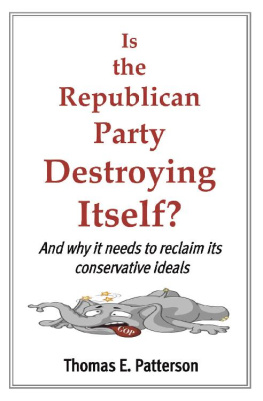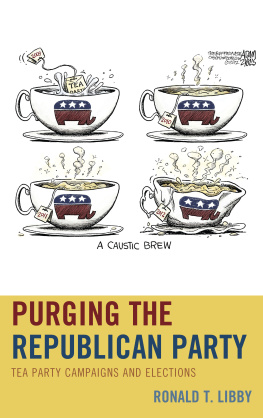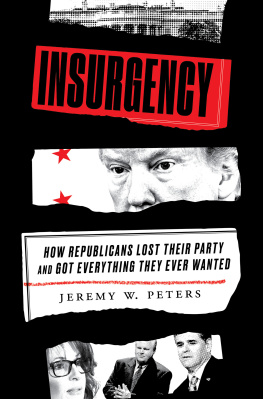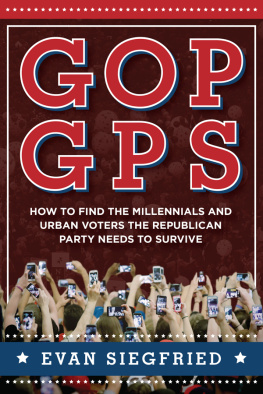Is the Republican Party
Destroying Itself?
KDP Publishing, Seattle, WA
ISBN: 9781658728638
Copyright 2020 Thomas E. Patterson
All rights reserved.
Printed in United States of America
About the Author
Thomas Patterson is the Bradlee Professor of Government & the Press at Harvard Universitys Kennedy School of Government.
He was raised in a small rural Minnesota town that was, and has remained, staunchly Republican. After college, he served in Vietnam as a lieutenant in the U.S. Army Special Forces. He then earned his PhD in political science and joined the faculty at Syracuse Universitys Maxwell School of Citizenship, where he taught for two decades before joining the Harvard faculty in 1996.
He is the author of several books, including Out of Order , which received the inaugural Graber Award as the best book of the decade in political communication, and The Unseeing Eye , which the American Association for Public Opinion Research named as one of the most influential books on public opinion in the previous half century. He is also the author of We the People (McGraw-Hill), an introductory American government college textbook thats now in its 13 th edition. He lives in Boston, Massachusetts.
Contents
About the Author
Introduction
One. The Republican Traps 1
Two. The Ideological Trap 5
Three. The Demographic Trap 35
Four. The Media Trap
Five. The Money Trap 88
Six. The Moral Trap
Seven. The Conservative Imperative 142
Notes
Introduction
A merica needs a healthy two-party system but hasnt had one in years. When not mired in gridlock and brinkmanship, the Republican and Democratic parties are beset by petty feuding and renegade behavior. Republican and Democrat voters are losing respect for reason and for each other. Deception is raging, as is anxiety. Intolerance is on the rise. One bad thing feeds off the next .
French philosopher Albert Camus said that one should never indulge in useless lamentations over an inescapable state of affairs. Perhaps our party system is so broken that its of this type. But I believe that it can be repaired, a task that necessarily starts with an understanding of why its broken. Both parties are to blame, but their contributions differ in scale and kind.
The Republican Party took a bad turn several decades ago and has since traveled a road harmful to America and to itself, which explains the books title, Is the Republican Party Destroying Itself? The GOP has set for itself five deadly traps that have eroded its ability to govern and acquire new sources of support. It could be facing a series of lopsided election defeats in the years ahead. That would be bad for the GOP and bad for the country, as I explain in the books final chapter, after having first devoted a chapter to each of the GOPs deadly traps: the ideological trap, the demographic trap, the media trap, the money trap, and the moral trap.
The Democratic Partys problem is different in kind. It stems from trying to manage its diversity and far-ranging policy commitments in an era of income inequality, wage stagnation, lengthening life spans, globalization, rapid demographic change, and the huge national debt that has accumulated since George W. Bushs administration. It would be a tall order for any political party and, if the Democrats cant shoulder it, our governing crisis could worsen. The Democratic Partys challenge is the subject of my next book. The title Can the Democrats Govern? foretells the test that it faces.
A few words about my political leanings are in order. Im a conservative when it comes to safeguarding political norms and institutions; a progressive when it comes to the quest for a more inclusive and sharing society; a libertarian when it comes to respecting peoples rights and private lives; and a populist when it comes to paying heed to the people.
Im an optimist in my faith in democracy. A democracys work is never done. Theres always a better democracy to be had if Americans work toward it. The founders of our constitutional system didnt claim to have the last word on how best to govern our nation, and we should be wary of those today who claim to have it.
I owe thanks to Kevin Wren, my Harvard assistant, for his tireless help; Lorie Conway, my wife, whose keen eye for weak spots in my prose and argument is my steadiest guide; and the scores of writers and scholars whose work has informed this book.
Thomas E. Patterson
Boston, Massachusetts
Is the Republican Party
Destroying Itself?
Thomas E. Patterson
CHAPTER ONE



The Republican Traps
Man is the only kind of varmint that sets
his own trap, baits it, then steps in it.
John Steinbeck, writer
On May 29, 1925, British explorer Percy Fawcett sent a letter to his wife Nina. He was deep in the Amazon seeking proof of a lost civilization, rumored to be one of great wealth. His final line was, You have no fear of any failure.
Those words were Fawcetts epitaph. An officer in the British Army, he had repeatedly ventured into the Amazon, seemingly immune to its dangers. Other explorers had fallen victim to disease or hostile natives, or had gone mad from battling insects, fatigue, and close encounters with death. Not Colonel Fawcett. He had spent years in the jungle, mapping it for the Royal Geographical Society. His reputation was legendary. His underwriters and acolytes thought that he was invincible. But sometime in the year of 1925, Fawcett disappeared, never to be heard from again
The epitaph of the Republican Party is not clear, nor is it certain there will be one. There is nothing in todays balance of power between the two parties that would predict a dark future for the Republican Party. The GOP holds the presidency and has a majority in the Senate. The Party also looks healthy through the lens of the past four decades. A year after the Watergate scandal forced President Richard Nixon to resign, political scientist Everett Carll Ladd described Americas two-party system as a party-and-a-half system. The 1974 midterm election had been a blowout. The Democrats had picked up 49 House and four Senate seats. In the 1976 election, Democrats won the presidency, a two-thirds majority in the House, and a filibuster-proof three-fifths majority in the Senate. It didnt last. Since 1980, the GOP has held the presidency for more years than the Democratic Party and controlled Congress for nearly as many years.
Nevertheless, theres a Fawcett-like hubris to the GOP. The GOP has walked itself into five traps, each of which threatens its future. Judging from history, one trap alone could be enough to send it into a tailspin. After the stock market crash of 1929, the Republican Party, which controlled the presidency and both houses of Congress, was trapped by its laissez-faire belief that the economy was self-correcting. Republicans stuck to their belief even as joblessness soared. Americans werent willing to wait for the economy to recover on its own. They voted heavily Democratic in the next three presidential elections, ushering in an era of Democratic control. In the period from 1932 to 1968, the Democrats held the presidency except for Dwight Eisenhowers two terms of office and controlled the House and Senate for all but four years.
Todays Republican Party is confronting five traps of its own making. They vary in their lethality but, together, could cripple the party for a generation or more. One trap is its steady movement to the right, which has distanced the party from the moderate voters who hold the balance of power in a two-party system. A second trap is demographic change. Younger adults and minorities vote heavily Democratic, and their numbers increase with each passing election. The older white voters upon whom the GOP depends are shrinking in number. Within two decades, based on demographic change alone, the GOP faces the prospect of being a second-rate party. Right-wing media are the Republicans third trap. A powerful force within the party, they have tied the GOP to policy positions and versions of reality that are blunting its ability to govern and to attract new voters. A fourth trap is the large tax cuts that the GOP has three times given the wealthy. The rich have reaped a windfall but at a high cost to the GOP. It has soiled its image as the party of the middle class and created a split between its working-class and marketplace voters. The fifth trap is the GOPs disregard for democratic norms and institutions, including its effort through voter ID laws to suppress the vote of minorities and lower-income Americans. In the process, it has made lasting enemies and created instruments of power that can be used against it.
Next page






